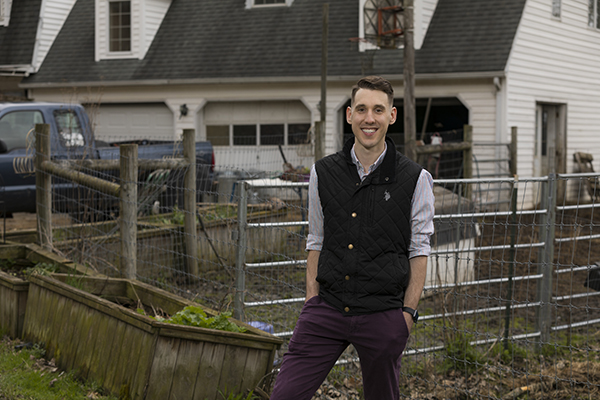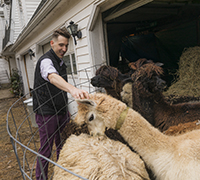TRUSTing to serve
New curricular track to focus on underserved populations

Bennett Doughty can still recall the words of wisdom from Founding Dean Gloria Meredith during his interview for a position at Binghamton University’s School of Pharmacy and Pharmaceutical Sciences.
“The phrase that still sticks with me was when Dean Meredith said: ‘It has at times been challenging to recruit faculty and staff to a rural area such as this, but with that said, everyone we have brought here shares the same passion and motivation for changing healthcare and extending treatment to populations in need,’” he says.
Trained in psychiatric pharmacy, Doughty joined the faculty in August 2018 as a clinical assistant professor of pharmacy practice. He took the dean’s words to heart and developed his own effort to expand healthcare. The Rural and Underserved Service Track (TRUST), scheduled to begin in fall 2020, is a cocurricular track that aims to develop a group of healthcare professionals dedicated to caring for rural, underserved populations through interprofessional teamwork.
“[The pharmacy school] is in a great position physically and metaphorically to give back to the surrounding area,” Doughty says. “This effort is just one of many ways we can begin to work with and give back to these communities.”
Trust origins
Doughty’s idea for TRUST came from his own experiences while studying at the University of Connecticut School of Pharmacy. The 2016 graduate was an active member of the Urban Service Track (UST) — one of the first interprofessional-based tracks targeting underserved populations.
Started more than 13 years ago, the UConn program currently unites students from six disciplines (pharmacy, nursing, dental, medical, social work and physician assistant) across two universities (Quinnipiac being the other) to promote expanded healthcare delivery, interprofessional collaboration, advocacy for healthcare expansion and leadership development. Among other things, the program delivers many service activities throughout the state, including community health fairs, immunization workshops and teen-pregnancy prevention sessions.
“We went to both urban and rural areas,” Doughty says. “We learned how to effectively work interprofessionally with populations that aren’t always given adequate treatment.”
Serving as the model for the Area Health Education Centers (AHEC) Scholars Program, a national program for health professions students, UST and its mission have remained with Doughty throughout his postdoctoral residency training in psychiatric pharmacy at the VA Connecticut Healthcare System and into his time here at Binghamton University.
“When I learned about [the pharmacy school’s] supportive environment, I reflected on my own education,” Doughty says. “One of, if not the most, important facets of my education at UConn was my participation in the Urban Service Track. I was given countless opportunities to work with populations that many won’t be exposed to (or unfortunately avoid) throughout their careers, and was able to develop my skills among some of the finest healthcare colleagues around. This program alone allowed me to develop my medical knowledge (through firsthand application), leadership skills, creative thinking and much more.
“I wanted to give those opportunities to students here,” he added. “So, starting this program just made sense.”
Placing trust
TRUST is a collaboration between the School of Pharmacy and Pharmaceutical Sciences, the Decker School of Nursing, the College of Community and Public Affairs’ Department of Social Work and SUNY Upstate Medical University. Each year, approximately eight students from each discipline will be admitted to the program and work together to tackle select challenges of rural healthcare.
While some rural components are already built into the pharmacy curriculum, Doughty says, “This program goes beyond that and shows that healthcare works best when you work collaboratively and creatively, both inside and outside of the exam room. This program will teach students that healthcare is not constrained to institutional settings — compassion really has no boundaries.”
The two-year, 160-hour program will require students to take part in “learning retreats.” Each will focus on an underserved population, a clinical case and a clinical skill, all of which will be delivered from interprofessional faculty/preceptors. Students will also attend discipline-specific courses and take part in service activities throughout Binghamton-area communities.
While there are no specific geographical boundaries for the program, Doughty is hopeful that TRUST will partner with local community efforts such as health centers, drug-treatment facilities and homeless shelters that are already involved in caring for underserved populations.
“Making those connections will show that we want to strengthen our relationships with the community and understand how we can best support them,” he says. “And by supporting the community, this program will also benefit our students, schools and Binghamton University as a whole.”
Doughty is working with colleagues and faculty members from the other schools to further develop the TRUST curriculum, learning retreats and activities.
Pam Stewart Fahs, professor and chair of rural nursing in the Decker School of Nursing (DSON), called the TRUST collaboration an exciting idea that will allow students to more fully explore and understand rural populations and culture.
“The Decker School of Nursing is known nationally for our focus on rural and vulnerable populations,” Fahs says. “This project provides another way for DSON students to prepare for providing healthcare in rural communities or to rural clients who have to go to more urbanized centers, particularly for specialty care. The opportunity for DSON undergraduate and graduate students to be part of TRUST comes at a time when interdisciplinary learning opportunities are being recognized as essential in the healthcare industry.”
Another TRUST supporter is Richard Merchant, a member of the pharmacy school’s Dean’s Advisory Council and CEO of Health WorkForce New York in Syracuse; the Northern Area Health Education Center in Potsdam, N.Y.; and the Central New York Area Health Education Center in Cortland, N.Y. He also serves as president of the New York State Association for Rural Health and is a member of the New York State AHEC System Executive Council.
Merchant is helping TRUST by working with SUNY Upstate Medical University on the collaboration and aiding in the development of community partnerships, Doughty says.
Merchant believes that TRUST has great potential and represents “a critical area of importance for the health of rural New York.”
“It may be useful to view pharmacy services in rural regions as not standing alone, but integrated and leveraged into the entire healthcare delivery system as well as the community — far more than in nonrural settings,” he says.
For example, Merchant says, rural clinicians often become leaders who help the economic health of their communities.
“Rural clinicians are not just integral, but key to rural health,” he says. “Therefore, a program designed as TRUST is designed brings a brilliant, feasible, measurable and meaningful approach to ensuring rural health for the long term.”
Trust vision
After the initial piloting of various learning retreats and service activities this coming fall and spring, Doughty plans to begin distributing applications in spring 2020, admitting the first official cohort of 32−40 TRUST scholars in fall 2020.
“This will be a competitive program,” he says. “We will be looking for students who have the drive and compassion to work with and for these populations.”
While the program will provide students the opportunities to take part in rural health, Doughty says it could also produce lifelong leaders in the field.
“Not everyone will fall in love with rural health,” he says. “But some of them could be inspired to seek out more opportunities in rural health, stay in the area or go to areas where they can improve healthcare. The beauty of this program is that you can apply its message to any healthcare setting. TRUST scholars will prove to be crucial members of any healthcare team they are a member of. ”
Doughty’s longer-term goals for TRUST include aligning it with the AHEC Scholars Program for potential recognition and funding and growing the number of schools/disciplines involved.
“My mindset is: How can we provide more opportunities to our students?” he says. “The ultimate goal is to give back to the community while also benefiting each discipline and its respective students. I’m excited to see where this program goes!”


